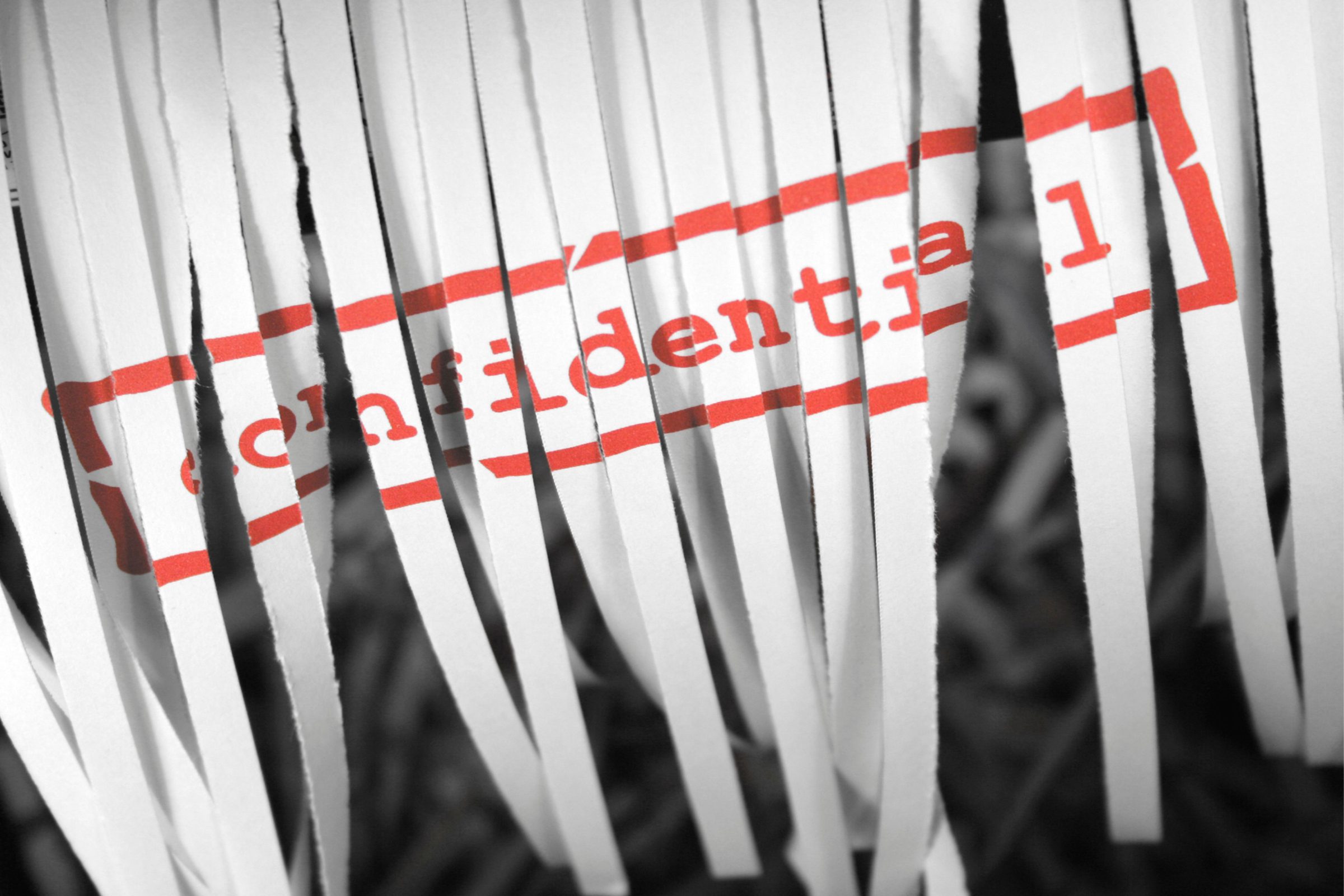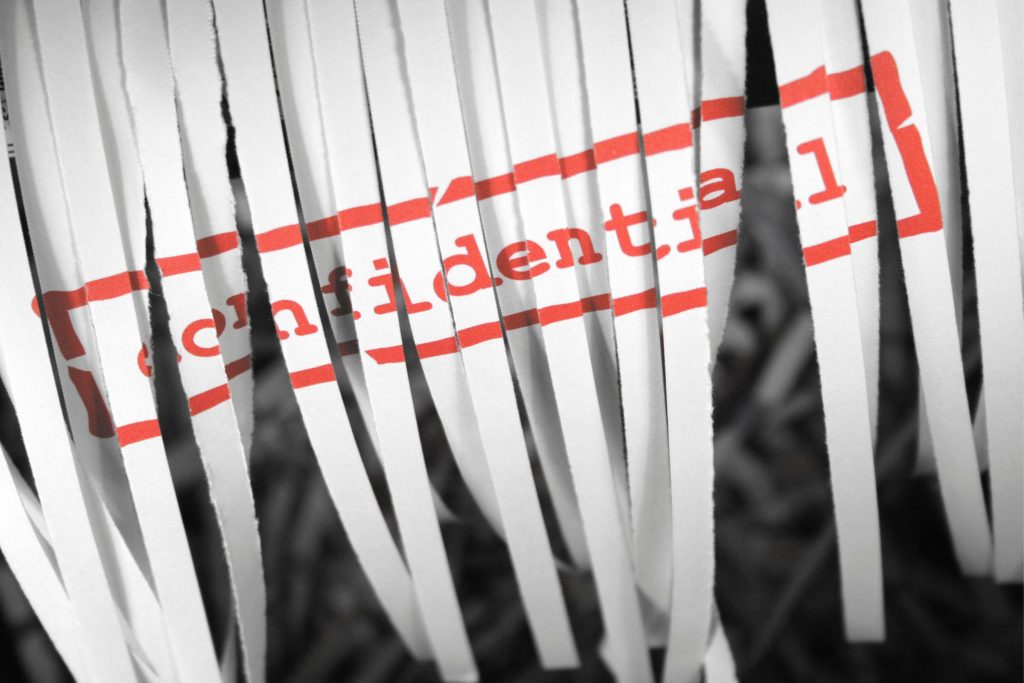The wheels of the modern world turn on information. It has the potential to be worth a great deal of money to most organisations. That means that uncontrolled disclosure can cost a business money, opportunities and reputation. Do you need to protect your valuable information with confidentiality agreements and NDAs? To note, NDA stands for “Non-Disclosure Agreement”, and it is just another term for a confidentiality agreement.
Shhh, it’s a secret! What does “confidential” mean, anyway?
It’s when you share information with someone, on the understanding that they will not share it with anyone else.
In a commercial context, confidentiality obligations often come about in an existing business contract, like a construction or services contract. Usually, those contracts have a term where the parties promise that they won’t disclose the information they come across during their business relationship.
Confidentiality obligations can also come up in a funny branch of law called “equity”, where sensitive information is said to be confidential “by its nature”.
This means it’s rare to need a separate confidentiality agreement.
So why would you bother with Confidentiality Agreements and NDAs?
Confidentiality agreements have a role to play during early discussions about a new business opportunity. That’s when you’re likely to disclose commercially sensitive or valuable information like pricing, IP or innovations, but you don’t yet have a contract to create that duty of confidence.
The other party might be a potential client, an investor, a prospective employee or a collaborator.
Sometimes you might ask a team member (e.g., an employee or shareholder) to sign a confidentiality agreement in addition to their existing contract, to impress on them the level of sensitivity of the information and the importance of keeping it to themselves.
4 key parts of Confidentiality Agreements and NDAs
The guts of the confidentiality agreement are going to be the same, no matter who the parties are or what the secret is. If you want to protect sensitive information from disclosure, you want to include 4 key parts:
1. Identify the parties
Be as exact as you can. Is the recipient of the information a corporate entity? Specify the full corporate name (including any trading name) and the ABN. Is it an individual recipient? Spell their name correctly and get their address too.
You want to make sure that the specific recipients understand and agree to keep the information to themselves.
2. Define “confidential information” broadly
Define every kind of information that will be “confidential”.
This will mean that the confidentiality promise captures the information no matter how it’s shared – whether orally, in writing, in a drawing, by video or in some other electronic format.
3. Specify a narrow “purpose” for disclosure in the agreement
Be very specific about the purpose for which the recipient is allowed to use the information.
For example, in a teaming agreement, it might be the joint pursuit of a named opportunity with a named project sponsor.
Collaborators are often competitors in other contexts, and you don’t want them blabbing your pricing info around town because you weren’t precise about what they were allowed to use it for. You don’t want a client to beat you up with your pricing breakdown in future, either.
4. Give the obligation a timeframe.
Agree on a period of time for the confidentiality obligations to apply.
If you’re protecting a commercial opportunity, you want to make sure that the agreement covers the period during which that opportunity is alive.
That said, make the timeframe realistic so you don’t squabble over it. Remember that commercial value tends to become obsolete quickly. If it’s your pricing info, it’s going to be out of date in a year or two, so there’s no need for a 10-year term.
Keeping it in the family: exclusivity
If the reason for the confidentiality is a strategic pursuit, you should also consider including an exclusivity term. If you’re sharing commercially sensitive information with a future client or partner to help them win a project, you want to try to make sure that you are on the same team, and that they won’t just use your info as a price check and then hang you out to dry.
You also want to confirm your ownership of any valuable IP that you’re sharing during the discussions or joint endeavours.
Is it enforceable?
One thing that is not well understood, is that confidentiality agreements are often not binding, because there is no exchange of consideration. In legal terms “consideration” means something of value, like services in exchange for fees. It’s necessary to make the agreement enforceable in a court of law.
I don’t fret about this, because parties almost never litigate confidentiality agreements and NDAs. I believe the psychological impact of signing a confidentiality agreement is worth as much as the legal protection. It makes the parties think “OK, I’m signing this document, I need to take confidentiality seriously here”.
However, if you are exchanging particularly sensitive or valuable information, you should think about executing the document “as a deed”. Deeds are legally binding even if nothing of value is exchanged, but take care to understand the quirks of signing.
Key takeaways
Before you give away any of your secrets, ask yourself these questions:
- Have I confirmed that there is no existing contract in place that creates confidentiality obligations?
- If the information I’m sharing falls into the wrong hands, would I or my business suffer a loss of money, opportunity or reputation?
- Do I want to make it crystal clear to the recipient how important it is that they keep the sensitive information confidential?
If the answer to any of these is yes, asking the other person to sign a confidentiality agreement might be worthwhile.
A great free NDA template
It’s extremely rare for parties to litigate confidentiality agreements. Because of that, I don’t agree that parties should burn resources on legal fees for drafting confidentiality agreements. I recommend OneNDA, where you can download a free, open-source confidentiality agreement. Plenty of big corporates that you know and trust have adopted the OneNDA template.
However, if you need to protect sensitive data, the other party is a bit iffy or you want exclusivity or IP protections, please reach out. Our prices for customised confidentiality agreements start at $275 plus GST, so it won’t break the bank.







